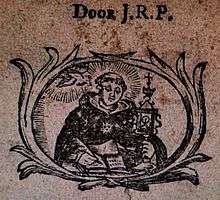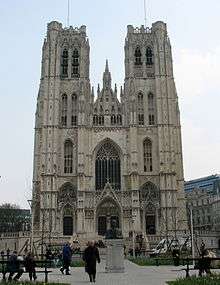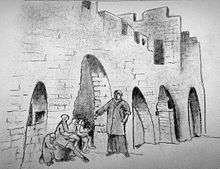Joannes Roucourt
Joannes (Jean, John) Roucourt (Leuven, baptized at June 7, 1636 - Brussels, died at September 26, 1676) was a Christian theologian and the parish priest of the Saint-Gudula Church at Brussels from 1667 until 1676. As a pastor, he was known as "father of the poor".


Life
Ethnicity and education
Roucourt was baptized on June 7, 1636 in the Saint-Jacobs church as a son of cloth-merchant Theodorus van Roucourt and Joanne Verwijst.[2][3] His cousins Dirk Roucourt and Hendrik Rocourt (Recourt) were brewer at Diest and horticulturist at Dordrecht, respectively. His forefathers originated from the Walloon region of Liège and the original family name was most likely "de Rocourt".[4] At the age of 16, Joannes completed his candidate training at the Faculty of Arts of the Old University of Leuven.[5][6] He then studied theology, followed lectures at "De Burcht" and graduated in 1660, receiving his Bachelor of Sacred Theology.[7][8] From that year on, he also studied philosophy and in 1663 Joannes received his Licenciate of Sacred Theology. He taught philosophy and in the thesis of Gerardus van der Masen "Tractatus de Aristotelis metaphysica" (1661-1662), Joannes Roucourt is mentioned as a professor at the University of Leuven.[5][9][10] On April 3, 1664, Joannes was present in the St. Peter's Church of Halen and witnessed the baptism of his niece, Maria Roucourt.[11]
Parish priest

During 1667-1676, Joannes was the parish priest of the collegiate church of Saint Michael and Saint Gudula in Brussels and as such responsible for the pastoral tasks of his parish.[7][12] According to Henne & Wauters he was known as the "father of the poor" and he lived himself in great austerity.[13] When receiving goods from wealthy people, he sold these and divided the proceeds among the 'souffrants de Jesus-Christ'. Joannes also donated his wages of several thousand florins, which he earned by teaching at the Old University of Leuven, to the poor people of Brussels. According to his death announcement, he also took care of the sick people, prisoners and soldiers.[5][14] Due to his large generosity, his friends had to regularly support him with necessities of life.
Theologian
Through a number of publications, Joannes Roucourt left his mark in the history of Christian theology, including in the area of penance.[7] His works are based on a strong pastoral thought and free from doctrines, says Lucien Ceyssens.[15] He preached that confessors of penance should also actively practice the Christian virtues and that they worked to prevent their flaws, such as blasphemy and cursing. The Italian Cardinal Giovanni Bona complimented Roucourt in 1674 with his books and wrote to him: I appreciate your method of questions and answers, which is very suitable to instruct believers and to convince heretics. Where others fail by writing (too) thick books, you are able to capture the essence in short phrases.[16][17] Joannes was also book censor of theological works and has given his approval to books from J. Vande Velde and Gummarus Huyghens.[18]
Death
.jpg)
While still being very active in performing all of his duties, he died from a malignant fever in Brussels on September 26, 1676 at the age of forty.[14][15] Two days later, he was buried in the collegiate church of St. Michael and St. Gudula, probably in the tomb of the Schockaert family who regarded him highly.[13][19] His honorable death announcement is preserved in the State Archives of Brussels (Anderlecht), describing the course of his life.[5]
Bibliography
- Tractatus de Aristotelis metaphysica (1661-1662). Joannes Roucourt (professor); Joannes Udalricus Randaxhe (professor); Gerardus van der Masen (student); Pedagogie De Burcht, Leuven. Ex Cathedra
- Aen-leydinge tot het oprecht geloove, door de merck-teeckenen der waerachtige Kercke Christi (1671). Door J(oannes)R(oucourt)P(riester). Te Leuven: by H. Nempe. 14 editions known. edition 1681
- Aen-leydinge tot de christelijcke hoope door het aanwijsen van't ghene men hoopen moet, en[de] waer op onse hoope moet steunen (1672). Door J(oannes)R(oucourt)P(riester). Te Ghendt: by Bauduyn Manilius (Boekdrukker). 10 editions known.
- Aen-leydinge tot de deught van penitentie, ofte Oprechte bekeeringhe des sondaers (1673). Door J(oannes)R(oucourt)P(riester). Tot Loven: by Hieronymus Nempe (Boekdrukker). 13 editions known. first edition
- Catechismus van de penitentie, oft der boedtveerdigheyt. Te Leuven: by H. Nempe. Several editions known. Herdruk tot Ghendt in 1676 door Franciscus en Dominicus vander Ween
References
- Blog Kerk en Toerisme Brussel: De St-Michiel- en St-Goedelekathedraal
- State Archives in Leuven, baptize registers St-Jacobs church (1633-1682),Digital registers State Archive of Belgium, scan 10 of 186 quote: 7 junius 1636, Eodem die baptiszatus est Joes filius Théodorici van Rochaut et Joanna Verweijst coniugum suscep(t) Henricus Hauwers et Mechtildus Isaacx.
- Town Archive in Leuven, schepenregister 8257 folio 211, act of September 1, 1639 (In: J. Caluwaerts, L. Elseviers (2003), Zeventiende-eeuwse poorters van Leuven, page 146) quote: Item in presentie der heere schepenen van Loven naerbeschreven gestaen Dierck van Royckoert soone Diercx geboren van Haelen laeckemaecker van sijnen stijl, is geworden innegeseten poirter deser stadt Loven, ende heeft daer toe gepresteert den behoirlijcken eedt."
- Genealogy of the Flemish-Dutch Roucourt & Recourt families
- Paul de Ridder (1987). Inventaris van het oud archief van de kapittelkerk van Sint-Michiel en Sint-Goedele te Brussel. Volume 2, page 72, folio 7867: Death notice of Joannes Roucourt, Plebaan (1676).Latin text, including English translation Wikimedia file.
- Korte geschiedenis van de Faculteit Letteren, KU Leuven
- Léonard Willems in: Biographie Nationale de Belgique. L'Academie Royale des Sciences, des Letters et des Beaux Arts de Belgique. Vol. 20 (Brussels, 1908-1910), pp. 203-204.
- Expositie bibliotheek KU Leuven: Studentenleven en organisatie van het universitair onderwijs.
- ODIS, Database Intermediary Structures Flandres: Joannes Roucourt
- Tractatus de Aristotelis metaphysica
- Halen, baptism registers Sint-Petruskerk (1637-1670), folio 200. Digitale church registers State Archive of Hasselt, scan 105 of 225.
- Prof. Reusens en Victor Barbier (1898). Analectes pour servir a L'Histoire Ecclésiastique de la Belgique. Deuxième série, Tome 11. Première Livraison. Leuven, pages 92-93.
- Alexandre Henne en Alphonse G.F. Wauters (1845). Histoire de la Ville de Bruxelles. Tome 3. Brussel, page 242.
- Jean François Foppens (1739).Bibliotheca Belgica Volume 2, Bruxellis, pages 719-720.
- Lucien Ceyssens In: Dictionnaire de Spiritualité, Tome 13, Colonne 1006: Roucourt (Racourt, Raucourt, Rocourt; Jean), prêtre, 1636-1676 website.
- Lucien Ceyssens (1968), La seconde période du Jansenisme, Tome 1 Sources des années 1673-1676, Bruxelles, page 206. citaat: "Laudo autem methodem qua uteris per interrogationes et responsiones; aptior est enim ad instruendos fideles et ad haereticos convincedos. Brevi etiam compendio feliciter perstrinxisti quidquid alii spissis voluminibus comprehendunt."
- Giovanni Bona.
- Gummarus Huygens (1673). Aenleydinge tot de waerachtige Liefde Godts door de kennisse Godts. J.Lempe (boekdrukker), Leuven, page 110. Tweede druk te Gent, Google books citaat: "APPROBATIE. Dit Boecxken ghenaempt Aenleydinghe tot de waerachtige Liefde Godts, komt wel over-een met de Heylighe Schrifture end' het Catholijck Gheloof, het is weert ghedruckt, ende van alle menschen ghelezen te woorden. Actum desen 22. April 1673. J.Rovcourt, S.T.L. Eccl, Coll. DD. Mich.& Gud. Plebanus Librorum Censor."
- Bruxelles, paroisse Saint Michel et Saint Gudule, Actes de décès, sépultures (1669-1683), 28 september 1676, akte 795. Digital church registers of the State Archive Belgium, scan 224 of 382 citaat: "Een lijck mette coll: in de kerck vande St. Goedele R(ev):Dominus Joannes Roucourt pleban dezer kercke."